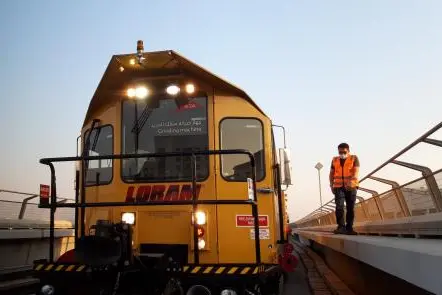PHOTO
Roads and Transport Authority – Nashwan Attaa’ee:
Dubai’s Roads and Transport Authority (RTA) has been accredited by a recent specialised benchmarking study accredited for the superior performance in ensuring that the daily operation of the Dubai Metro complies with the standard noise and vibration levels. Such findings were made in a study that covered multiple metro systems of metropolitan cities in the second half of 2020.
Abdul Muhsen Ibrahim Younus, CEO of Rail Agency, RTA, expressed his delight with this important technical achievement. “This achievement is a testament to the daily operational efficiency of the metro system as well as the safety and security levels of the metro service. RTA prioritises these two elements and endeavours to achieve them with distinction,” said Younes.
“The study focused on identifying the challenges confronting the metro operators as regards the noise and vibration generated by the metro operation, measuring the level of noise and vibrations, and analysing the underlying reasons and associated factors. The study also tackled legislation and policies implemented in cosmopolitan cities, procedures for measuring and monitoring, and the technical solutions taken to mitigate the negative impacts of noise and vibration on the community,” explained Younes.
The study confirmed the superiority of the Dubai Metro in comparison with other global metro systems in terms of reduced noise and vibration, thanks to the daily operation and maintenance of the rail tracks. These findings are credited to the preventive measures taken by the Rail Agency in several aspects relating to the suppression of noise and vibration of the metro.
The study concluded to several key findings namely: The Dubai Metro is in a group of 10 metro systems (out of 27 metro systems covered by the study) that uses effective Key Performance Indicators to measure noise and vibration levels. RTA was unique in having a technical manual for noise and vibration for rail systems.
The study ranked Dubai Metro amongst the top in tackling issues related to vibrations resulting from the metro operation and maintenance. Such treatment measures are highlighted by the rail grinding programme. The Dubai Metro was amongst the few metros that has a robust brakes inspection system as brakes are the key cause of noise levels. It was also amongst the top in receiving the least number of annual complaints relating to noise and vibration levels. Additionally, Dubai Metro was in the Top 11 metro systems that maintain monthly inspections relating to wheel reprofiling.
-Ends-
© Press Release 2021
Disclaimer: The contents of this press release was provided from an external third party provider. This website is not responsible for, and does not control, such external content. This content is provided on an “as is” and “as available” basis and has not been edited in any way. Neither this website nor our affiliates guarantee the accuracy of or endorse the views or opinions expressed in this press release.
The press release is provided for informational purposes only. The content does not provide tax, legal or investment advice or opinion regarding the suitability, value or profitability of any particular security, portfolio or investment strategy. Neither this website nor our affiliates shall be liable for any errors or inaccuracies in the content, or for any actions taken by you in reliance thereon. You expressly agree that your use of the information within this article is at your sole risk.
To the fullest extent permitted by applicable law, this website, its parent company, its subsidiaries, its affiliates and the respective shareholders, directors, officers, employees, agents, advertisers, content providers and licensors will not be liable (jointly or severally) to you for any direct, indirect, consequential, special, incidental, punitive or exemplary damages, including without limitation, lost profits, lost savings and lost revenues, whether in negligence, tort, contract or any other theory of liability, even if the parties have been advised of the possibility or could have foreseen any such damages.




















